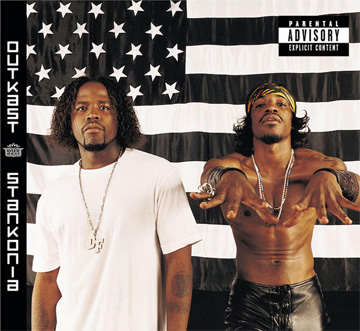OutKast
Why name the song “Rosa Parks”? Why name the song “Bombs over Baghdad”?
Reading
- Civil Rights Icon Can Sue OutKast (bbc.com, 2003)
- The Making of OutKast’s Aquemini (clatl.com)
(The whole interview is great, but you only have to read the section on “Rosa Parks”)
Viewing
- Excerpt from Barbershop (Tim Story, 2002)
- Rosa Parks (OutKast, 1998)
- Bombs over Baghdad (B.O.B.) (OutKast, 2000)
Listening
- Nathaniel (OutKast, 1998)
- Gasoline Dreams (OutKast, 2000)
Study Guide
Note that this guide is not meant to replace careful study of the assigned texts. Instead, this guide highlights some of the important ideas and information found in these chapters, songs, and videos. To do well on our tests, quizzes, and class discussions, you will need a thorough knowledge of all assigned texts.
Although OutKast apparently did not name the song “Rosa Parks” in order to poke fun at the icon, many fans and critics definitely saw it this way. Similarly, the 2002 film Barbershop provoked strong reactions in the Black Public Sphere through its irreverent comments on Parks, Jessie Jackson, and Martin Luther King.
A question: Why would audiences at the turn of the century find these provocations worth talking about? In other words, what work within the Black community was accomplished through this humor and the arguments and discussions that it provoked?
On the meanings of “Rosa Parks”
In 1998, OutKast’s major competition was dead. Literally.
Released seven months before his murder, Tupac Shakur’s 1996 album All Eyez on Me eventually sold 9 million copies. Released the following year, Notorious B.I.G.’s posthumous Life After Death would sell 10 million, and Shakur’s R U Still Down sold 4 million. The year after that, 1998, Shakur’s estate released his Greatest Hits, which eventually sold 10 million copies.
OutKast, meanwhile, had a solid success with their debut 1994 album Southernplayalisticadillacmuzik, and sold 2 million copies of their 1996 release, ATLiens. But they got little respect from the hip-hop establishment. Famously, the audience booed the band during their acceptance speech for the “Best Newcomer” category at the 1995 Source Awards. And even many fans were disenchanted by the spacey, ambitious sound of ATLiens.
In 1998, then, the band had something to prove.
From the interlude after “Rosa Parks”:
“It’s just major right here, you know what I’m saying? Yo son, y’all niggers, ya’ll niggers is holding it, man. Straight up, man.
Word man. I’m glad we got together to do this. You know what I’m talking about? Everybody–north, south, east, west. You know what I’m saying? [No doubt.] We’re doing this thing right here, straight up, for hip hop.
We handling the earth right now. Y’all niggers don’t even know. [For sure.] You know what I mean? If it wasn’t for us trying to enlighten y’all niggers with all types of flows and flavors, the game wouldn’t be the same.
That’s right man. You got to keep it [You know what I mean?] innovative and new, creative. You know what I’m saying? [No doubt.] You know what I’m saying? [No doubt.] Some people don’t want to hear the same old thing over and over again.
No doubt. You got to come provocative, nigger. You know what I mean? [Word.] Shit got to be spine-tingling with mad styles and crazy, dangerous–I mean, bust-this-shit-open–beats. You know what I mean? It’s like, Yo! [Word.] Niggers don’t even know. Son, yo, we gonna play some funky shit for y’all. [That’s right.] Straight up. Pay up, pay up, pay up, nigger.
From East Point to Shaolin–y’all better know that! [Uh huh. Yee-ah.] Hit this heavy.”
It’s hard to summarize this conversation, but a couple of things seem important:
- This interlude, along with other aspects of the album, frame Aquemini as a reaction against the creative exhaustion of gangsta as a subgenre.
- The interlude conversation includes Raekwon, a member of the Wu Tang Clan, one of the preeminent bands of New York’s hip hop scene. [Shaolin is a key symbol within the Wu Tang Clan’s elaborate mythology.] Raekwon’s contributions to the album emphasize OutKast’s ambition to hold up “Everybody–north, south, east, west” rather than simply to reject older styles.
- The hook’s call to “hush this fuss” might refer to the bitter and bloody East/West feud. The call to “move to the back of the bus” can be taken as a critique of conscious hip hop.
- At the same time, other songs on the album, including “Nathaniel” and “Return of the Gangster,” ground the music in the hard realities of life in a racist society.
Later Work
A (serious) question: Is Stankonia in America?

Quiz
- OutKast